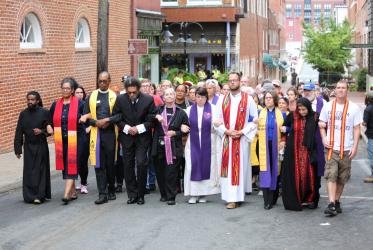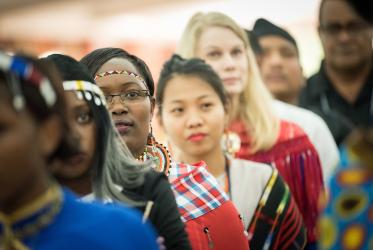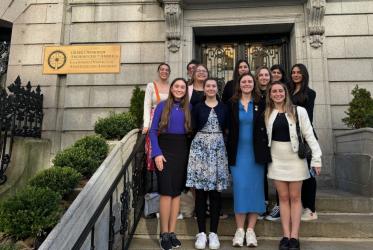“Racism remains an issue that divides society and even families,” said Dr Agnes Abuom, moderator of the Central Committee of the World Council of Churches (WCC), in a Washington DC workshop on “the theological basis for lifting the voice of the marginalized.” She noted that these dramatically relevant words were not her own, but are drawn from a WCC study on race undertaken in the 1990s. Its report encouraged the council to “accompany the churches” as they respond to racial confrontation, and to aid in coordinating those responses whenever possible and appropriate.
April 2016 marks a continuation of the WCC’s journey with member churches and concerned Christians amid the manifestations of division and unrest in US civil and political life. A delegation representing member churches of the WCC will visit four metropolitan areas in the United States to listen to US residents and understand their experience of discrimination, oppression and violence in recent years.
“We come with heavy hearts,” said Abuom, “because we have been following developments in this nation. The WCC recognizes the many positive actions of churches here, but they do not seem to be enough. Church life must provide the means of grace to strengthen us for action.”
Over the past several years since the 10th Assembly of the WCC in Busan, Republic of Korea, in 2013, the WCC has framed its contemporary journey in terms of participation in a “pilgrimage of justice and peace.” Abuom pondered “the significance of walking together in the United States as part of a pilgrimage that is global, yet always with significant local dimensions.”
A delegation assembles
In mid-April, leaders of the WCC Central Committee held their Washington preparatory meeting for a June 2016 meeting at Trondheim, Norway in mid-April, concluding in time for the opening on 15 April of Ecumenical Advocacy Days (EADs), an annual opportunity for learning and lobbying the US government concerning issues of social justice. The theme of EADs in 2016 is “Lift Every Voice! - Racism, Class & Power - Election Year National Gathering and Lobby Day.”
“Against the background of this current presidential campaign,” said Rev. John L. McCullough of Church World Service (CWS) at the opening celebration of the event, “we need to make sure that the voice of one of the candidates is not the only voice that is heard.”
Both WCC moderator Abuom and general secretary Rev. Dr Olav Fykse Tveit were invited by ecumenical organizers including the CWS and National Council of the Churches of Christ in the USA to address sessions of the conference. They also spoke at Sunday gatherings for worship at Shiloh Baptist Church and Foundry United Methodist Church.
As more participants in the racial justice support visit of the WCC arrived in Washington, an opportunity arose to interact with leaders of the Christian citizen’s lobby Bread for the World, an advocacy organization founded in 1974 by the Rev. Art Simon and, as the original Bread for the World board chairperson, Rev. Dr Eugene Carson Blake following his retirement as the second general secretary of the WCC.
Appointments were confirmed on 18 April for meetings with leaders of the Sojourners community, the US State Department office on religion and global affairs, and the leadership conference on civil and human rights.
The journey of listening and support
The WCC racial justice visit to the USA will result in a report and presentation to the WCC Central Committee when it meets at Trondheim, Norway in June 2016. The journey will take an international contingent of more than a dozen Christians from Washington DC through Charleston, South Carolina to Saint Louis and Ferguson, Missouri, concluding in Chicago, Illinois, and encountering along the way members and leaders of churches, movements and local communities who have been actively engaged in meeting the needs of American society in a time of turmoil and tragic acts of violence.
During their visit to Bread for the World, Rev. Dr Angelique Walker Smith, who holds responsibilities in both the organizations that were meeting, told the WCC delegates: “You will be going to some of the most volatile communities in the world. People feel burned up. Really try to listen to their hearts. Work to understand their experience.”
Some delegates will bring international perspectives on relations between minorities and majority populations, and actions by local and national authorities. One young Eastern Orthodox layman comes from Palestine, a woman pastor is an official of the Korean Christian Church in Japan and two other participants are members of First Nations in Canada.
WCC general secretary Tveit, recalling his own visits in recent months to troubled areas from Burundi to Israel and Palestine, including refugee camps in Europe, encouraged the ecumenical visitors to the United States.
“We need to continue to walk together,” he said. “We need one another. We need to see ourselves as created in the image of God. And we need to do what we can to make this world a place where everyone realizes that we are all made in the image of God.”
The WCC racial justice visit to the USA continues through 25 April.







